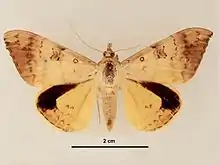Oxyodes scrobiculata
Oxyodes scrobiculata, the longan semi-looper or longan leaf-eating looper, is a moth of the family Erebidae. The common name "looper" is used despite looper moths generally being in the family Geometridae. The species was first described by Johan Christian Fabricius in 1775. It is found from the Indo-Australian tropics of India, Sri Lanka, Myanmar, China, east to Guam, Queensland, New Caledonia, Fiji, Samoa and Tonga.[1]
| Longan semi-looper | |
|---|---|
_(10226930413).jpg.webp) | |
| Scientific classification | |
| Kingdom: | |
| Phylum: | |
| Class: | |
| Order: | |
| Family: | |
| Genus: | |
| Species: | O. scrobiculata |
| Binomial name | |
| Oxyodes scrobiculata (Fabricius, 1775) | |
| Synonyms | |
| |
Description
Its wingspan is about 64 mm. Body ochreous brown or yellow ochreous. Forewing with sub-basal, antemedial, medial, two post-medial and a sub-marginal indistinct waved line present. Orbicular and reniform with black edges and often filled in with black. A lunulate mark often present below the cell. Hindwings with a broad black fascia found below the costa. There are two post-medial lines and an indistinct sub-marginal lunules series can be seen. Ventral side brownish, irrorated (sprinkled) with grey. Both wings with ochreous inner area and a speck at end of cell. A postmedial line and blackish blotches found on outer area.[2]
Larva slender, tapering slightly at each end. Body pale emerald green with fine pale yellow dorsolateral lines. The abdominal pairs are reduced slightly towards the anterior. The larvae feed on Aglaia, Dimocarpus longan, Litchi chinensis and Nephelium lappaceum species.[3]
 Male
Male Female
Female
References
- Herbison-Evans, Don & Crossley, Stella (25 March 2016). "Oxyodes scrobiculata (Fabricius, 1775) Longan Leaf Eating Looper". Australian Caterpillars and their Butterflies and Moths. Retrieved 21 January 2019.
- Hampson, G. F. (1894). The Fauna of British India, Including Ceylon and Burma: Moths Volume II. Taylor and Francis – via Biodiversity Heritage Library.
- Holloway, Jeremy Daniel. "Oxyodes scrobiculata Fabricius". The Moths of Borneo. Retrieved 17 August 2016.